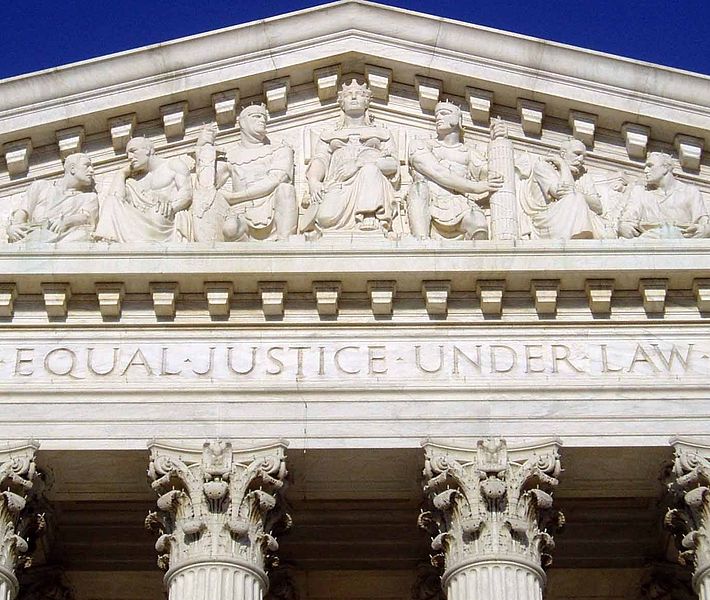They are not accustomed to fanfare. Nor do they prefer it.
But the Little Sisters of the Poor (along with several co-petitioners) found themselves thrust into the limelight of the Supreme Court. Why were they there?
To preserve their Conscience.
March 23rd was the day that the incomparable attorney Paul Clement and his fellow attorney Noel Francisco would present their cases opposite United States Solicitor General Donald Verrilli, Jr. The forum to whom they presented was an eight justice Supreme Court with a profoundly empty ninth seat.
The question at hand? Does the Affordable Care Act (aka Obamacare) Health and Human Services Mandate (requiring employers to provide insurance coverage for employee contraceptives, sterilizations and abortifacients) violate the religious liberties of the Little Sisters of the Poor (and their co-petitioners)?
The genesis of this conflict originates from a clause in the ACA law deeming that all private plans must provide preventive services free of co-payments, deductibles and cost-sharing. The list of preventive measures to be included came from the recommendations of the U.S. Preventive Services Task Force (USPSTF), the Advisory Committee on Immunization Practices (ACIP), the Health Resources and Services Administration’s (HRSA’s) Bright Futures Project, and the Institute of Medicine (IOM) committee on women’s clinical preventive services. The delivery of these services would be enforced by the federal bureaucracy, namely the Department of Health and Human Services.
Exemptions were granted to churches (proper) and grandfathered entities whose plan originated before March, 2010. Covered items included immunizations, screening tests for diabetes and high cholesterol, dietary and nutrition counseling and screening for breast and colon cancer.
But what gave the Little Sisters pause was the mandated coverage of birth control medicines/devices, sterilization and abortifacients. Being self-insured, the Little Sisters believe that to assent to the HHS Mandate and pay their insurer to cover what they felt was sinful, was simply wrong.
So they objected.
In turn, the federal government was not pleased. In short order, the threat of penalties amounting to $100 per employee per day ($70 million per year) risked initially consuming one third of Little Sisters operating budget. This would assuredly lead their 27 homes serving the elderly poor in America to financial ruin. On December 31, 2013 Supreme Court Justice Sonia Sotomayor granted a stay on any penalties pending review. An “accommodation” was offered by the federal government which, after several iterations, landed on the duty of the objector to notify the federal government of its objection. After this notification, the government would notify the objector’s insurer who would then cover the objectionable services through a “parallel, but unaffiliated” mechanism. This accommodation was thought inadequate, especially to the Little Sisters who are self-insured and reasoned that to notify the government of their objection and trigger another entity to provide services in their stead makes them sin by proxy. This is even more since it would come through the very insurance with whom they had contracted. While the government soothed by saying, “You’re not complicit”, the Little Sisters disagreed.
And so today, the Little Sisters of the Poor et al. squared away against Syliva Burwell, Secretary of Health and Human Services et al.
The legal battle pitted the government’s interpretation and enforcement of the Affordable Care Act’s HHS Mandate against the Constitution’s Free Exercise (of religion) Clause of the First Amendment and the 1993 Religious Freedom and Restoration Act (RFRA). If this all sounds strangely familiar, it is because it was similarly contested in 2014’s Burwell vs. Hobby Lobby in which by a 5-4 decision the HHS Mandate was in violation of the Religious Freedom and Restoration Act.
Tonight, I read the arguments made by attorneys Clement, Francisco and Verrilli before the Supreme Court. And here are some thoughts.
The Little Sisters of the Poor’s case rests on religious freedom. Religious freedom is one of the first freedoms of our democracy. It is hard to deny this when the First Amendment to the Constitution decisively states,
Congress shall make no law respecting an establishment of religion, or prohibiting the free exercise thereof…
That said, there has been a pattern in time for laws to be passed which could inadvertently infringe on a citizen’s right to freely exercise their faith. Mindful of striking a balance between protecting the right to exercise faith and preventing the frivolous invocation of “religious freedom” for any selfishly manufactured pet issue, Congress overwhelmingly (unanimous in House, 97-3 in Senate) passed the Religious Freedom and Restoration Act (RFRA) in 1993. This law declares that religious freedom is paramount and that any federal law that should violate this first freedom must prove that it is done in the name of a compelling governmental interest, does not impose a substantial burden on the religious practitioner and is the least restrictive means to achieve the desired ends. This seems to make sense.
The federal government’s case, however, rests on the narrowly-passed (60-39 Senate, 219-212 House) Affordable Care Act’s provision to cover preventive measures, the details of which were determined by (if not outsourced to) entities enmeshed in the federal bureaucracy. And the Hobby Lobby case was decided in favor of Hobby Lobby and the RFRA only one year ago.
What is curious in listening to the oral arguments is how Clement and Francisco return again and again to the questions raised by RFRA: Is there a compelling government interest? Is there a substantial burden on the Little Sisters of the Poor if they do or don’t comply? Is there a less restrictive means? The answers, from the government’s Solicitor General Verrilli, are striking.
Is there a compelling government interest?
Solicitor General Verrilli: “[To provide the Little Sisters of the Poor an exemption similar to that provided to a church] presents the same problem of creating the obstacle which creates the inertia problem [that is, if there is an obstacle, the individual may simply not go to the trouble of getting the contraceptive/sterilization/abortifacient], which undermines the compelling interest of the Institute of Medicine and HHS, but of Congress itself [to make sure contraceptives/sterilizations/abortifacients are paid for everybody by their employer]” (italics mine)
Chief Justice Roberts (later in the case): “It seems to me that the balance is pretty clear. You want the coverage for contraceptive services to be provided, I think as you – as it said, seamlessly. You want it to be in the one insurance package. That’s done. That is the compelling government interest. And on the other side, the question is whether people who have sincere religious objections to being complicit in that through the hiring of the insurance company, the third party administrator on terms where they provided [contraceptives, sterilizations, abortifacients], whether the government’s compelling interest outweighs those sincere religious objections. Is that a fair understanding of the case?”
Is there a substantial burden if the Little Sisters do or do not comply?
Justice Kennedy: “Do you concede that there’s a substantial burden?
Solicitor General Verrilli: “We do not concede there’s a substantial burden, Justice Kennedy. We – we concede that the religious belief is sincere. We’re not questioning sincerity of the belief, but we don’t think that in a case in which the – an – when a question is this, when a religious objection is made to the independent arrangements the government makes with third parties to fill a regulatory gap created by granting an exemption from a – a generally applicable rule, that that qualifies as —”
Justice Kennedy: “Well, do – do you question their belief that they’re complicit in the moral wrong?
Solicitor General Verrilli: “No, we do not.”
Justice Kennedy: “Well, then – then it seems to me that that’s a substantial burden.”
Is there a less restrictive means (to achieve the government’s goal without violating religious freedom)?
Attorney Francisco (for the petitioners): “We then turn to less restrictive means…It’s quite clear that the government has alternatives because it’s the same alternatives it uses for everybody else (grandfathered plans, churches, religious orders). And if all those alternatives are fine with them, they at least need evidence explaining why they’re not fine for us as well.”
In conclusion, consider this from the government’s Solicitor General Verrilli,
“The whole point here, Justice Alito, is that Congress wanted to eliminate – even what were perceived by most of the small barriers, like a $5 or $10 co-pay, because the medical experts said that even though small barriers – even when you’re getting it as part of your regular coverage, even those small barriers work as a sufficient disincentive that many fewer people use contraception than would otherwise…”
Where the federal government has offered exemptions to “houses of worship” and has grandfathered in massive companies immune to the Mandate (Chevron, Visa Inc., PepsiCo, ExxonMobil – does the government not worry about their employees access to paid contraceptives, sterilizations and abortifacients?), it has decided to go to the mat against the Little Sisters of the Poor. We have come to a point in modern jurisprudence where the Free Exercise of Religion is pitted against the “small barriers, like a $5 or $10 co-pay” and the “inertia problem” of someone who simply isn’t motivated to seek these services when they aren’t simply given to them.
The Little Sisters of the Poor are not accustomed to fanfare. Nor do they prefer it.
But they came to Court to preserve their Conscience.
Will that be allowed?
—————————–
Photo credit: Wikimedia Commons













